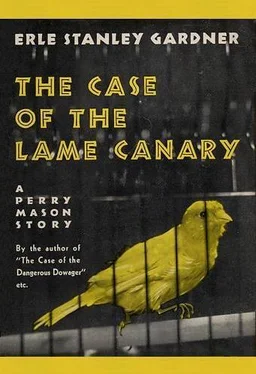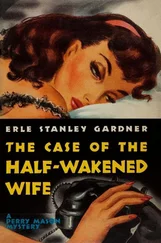Erle Gardner - The Case of the Lame Canary
Здесь есть возможность читать онлайн «Erle Gardner - The Case of the Lame Canary» весь текст электронной книги совершенно бесплатно (целиком полную версию без сокращений). В некоторых случаях можно слушать аудио, скачать через торрент в формате fb2 и присутствует краткое содержание. Город: New York, Год выпуска: 1937, Издательство: William Morrow, Жанр: Классический детектив, на английском языке. Описание произведения, (предисловие) а так же отзывы посетителей доступны на портале библиотеки ЛибКат.
- Название:The Case of the Lame Canary
- Автор:
- Издательство:William Morrow
- Жанр:
- Год:1937
- Город:New York
- ISBN:нет данных
- Рейтинг книги:4 / 5. Голосов: 1
-
Избранное:Добавить в избранное
- Отзывы:
-
Ваша оценка:
- 80
- 1
- 2
- 3
- 4
- 5
The Case of the Lame Canary: краткое содержание, описание и аннотация
Предлагаем к чтению аннотацию, описание, краткое содержание или предисловие (зависит от того, что написал сам автор книги «The Case of the Lame Canary»). Если вы не нашли необходимую информацию о книге — напишите в комментариях, мы постараемся отыскать её.
The Case of the Lame Canary — читать онлайн бесплатно полную книгу (весь текст) целиком
Ниже представлен текст книги, разбитый по страницам. Система сохранения места последней прочитанной страницы, позволяет с удобством читать онлайн бесплатно книгу «The Case of the Lame Canary», без необходимости каждый раз заново искать на чём Вы остановились. Поставьте закладку, и сможете в любой момент перейти на страницу, на которой закончили чтение.
Интервал:
Закладка:
Drake hung up the receiver, turned to Mason and said, “Perry, I was just wondering. Do you suppose this Swaine girl would have any reason for wanting her sister out of the way?”
“Forget it,” Mason told him. “If you must pin a murder on someone, hang it on the guy who was in there making love to the sister. Don’t wish it off on one of my clients.”
“Is the Swaine girl your client?” Drake asked as they walked toward the door of the drug store.
Mason said slowly, “Come to think of it, Paul, she isn’t. She’s the one who employed me, but I’m employed to represent the married sister.”
“You mean Mrs. Prescott?”
“Yes.”
Drake said, “Well, I’ll bet you five to one your client’s dead, then, Perry.”
Mason said, “I think I’ll leave my car here, Paul, and ride out with you. That’ll give us a chance to talk. Just how do you figure it’s Mrs. Prescott who’s killed?”
“It’s a cinch,” Drake said. “According to Mrs. Anderson, the murder must have been right around noon, just before that automobile accident. Now, at that time of day, Walter Prescott, as a business man, would be at his office, but Mrs. Prescott would be playing housewife.”
“Prescott may have slept late,” Mason pointed out.
“No. Remember that he got Harry Trader to take some things up to his garage, and gave Trader a key to the garage. That shows that he was not only up this morning, but that he didn’t intend to be home when Trader made the delivery, and Trader was coming to make the delivery just about the time the Swaine girl and her boy-friend were hiding the gun.”
Mason nodded as Drake started the car. “Good reasoning, Drake,” he said.
“It’s a gift,” Drake grinned.
“Then,” Mason told him, “you might try this one: Rita Swaine and her boy-friend are at the back of the house, in the solarium, at the time of the accident. But Packard saw something in a window. He could only have seen the front of the house. Now, then, who else was in that house, and what or whom did Packard see in that window? And remember, Mister Wise-Guy, it must have been something interesting enough to send him crashing into a moving van.”
Drake said ruefully, “You would bring that up. Okay, Perry, your clients have an alibi — if Packard saw what you think he saw in the front of the house — only don’t forget it might not have been any crime at all, perhaps some woman who’d forgotten to pull down the shades — perhaps she’d got blood stains on her clothes when she killed someone, and was—”
Mason laughed. “There you go again! You have a criminal mind, Paul, and you’ll be imagining my clients into the gallows before you’re done. Step on it, and let’s see what that medico says.”
“Don’t try crawfishing,” Drake insisted. “I rather like that blood-stained clothes business myself.”
Chapter five
Dr. James Wallace was still on duty at the Good Samaritan Hospital when Mason and Drake arrived. He listened to Mason’s introduction with courteous attention.
“Indeed, yes,” he said, shaking hands, “I remember the patient perfectly. He was received at twelve-ten this afternoon. For the most part, his injuries were cranial and superficial, but there was a most interesting condition which is sometimes encountered in cases of this sort. The man was suffering from traumatic amnesia.”
“Translated into English,” Drake said, “what is traumatic amnesia?”
The doctor favored Drake with a condescending smile and said, “Pardon. I didn’t intend to use technical terminology. Amnesia is a loss of memory. Victims of amnesia know nothing of their past, cannot tell their names; of anything about themselves. And traumatic, of course, implies that the cause of the amnesia was superinduced by injury, that is, an external violence.”
“Let’s see if I understand you, Doctor,” Mason said. “When Packard regained consciousness he had an impaired memory — is that right?”
“That’s right,” Dr. Wallace said in his well modulated, suavely courteous voice. “There were no broken bones. In fact, from what I hear of the accident, I would say he had escaped remarkably well. There were a few ecchymoses, one or two superficial cuts about the face, the possibility of a strained ligament, and, of course, the effect of shock. My treatment of his physical injuries took only a very few minutes.
“According to the statement of the man who brought him here, the collision had been rather severe. The patient had been unconscious when lifted into the truck. He regained consciousness as he was being carried on the stretcher to the surgery, but he had a complete lapse of memory. He couldn’t tell us his name, his occupation, where he came from, whether he was married or single, or anything about himself. We searched his pockets and founds cards which showed that he was Carl Packard, of Altaville, California. I was very careful not to call his attention to these cards, or do anything which might refresh his recollection until after the effect of the shock had worn off somewhat, and I had satisfied myself there were no serious injuries. Then I gave him a brandy, talked with him for a few moments, and then quite casually asked him how things were in Altaville.”
There was a moment of dramatic silence, while Dr. Wallace stood smiling at them, waiting for the effect of his strategy to sink in.
“Had I attached undue importance to the question,” Dr. Wallace went on to explain, “the man would have sensed that I was placing too much emphasis on it, and unconsciously would have known why. Thereupon the temporary paralysis of the memory function would have been aggravated by a process of self-consciousness, just as we sometimes encounter in bad cases of stage-fright. We—”
“Never mind that,” Mason interrupted. “ Did. he recover his memory?”
“Yes,” Dr. Wallace said, the tone of his monosyllabic answer a rebuke to the lawyer’s abruptness.
“Did he remember his name?”
“Yes.”
“Did you have to tell him his name or did he remember it of his own accord?”
“He remembered it of his own accord,” Dr. Wallace said with dignity. “If you will permit me to give you a complete report, I think you will get the picture a little more accurately.”
“Go ahead,” Mason said, pulling his cigarette case from his pocket. Drake looked around the room, sighed, dropped into a chair, propped his head back against the wall and closed his eyes.
“When I asked him how things were in Altaville,” Dr. Wallace said, “I took particular pains to make my question casual. His answer was equally casual. I asked him if he knew the President of the First National Bank in Altaville, and he said he did, said he knew him quite well. We chatted along for a moment, and I asked him just where he lived in Altaville. He gave me an address which coincided with that on his driving license. I asked him his name. He told me. By degrees I brought him up to the accident, and then he remembered it perfectly.”
“What did he say about it?”
“Said that he was the one who was at fault. The truck man, Mr. Trader, was very business-like. He said he was insured; that if he were to blame, the insurance company would pay, but he wasn’t at fault. Packard seemed rather sheepish about it. He said he’d seen something in the window of one of the houses on his right, that he’d craned his neck to get a better look and then sensed something closing in on his left. The crash came almost at once, and that’s all he remembers.”
“Did he say what he saw in the window?”
“No, but he seemed a bit — well, embarrassed. I think ‘sheepish’ describes it.”
Читать дальшеИнтервал:
Закладка:
Похожие книги на «The Case of the Lame Canary»
Представляем Вашему вниманию похожие книги на «The Case of the Lame Canary» списком для выбора. Мы отобрали схожую по названию и смыслу литературу в надежде предоставить читателям больше вариантов отыскать новые, интересные, ещё непрочитанные произведения.
Обсуждение, отзывы о книге «The Case of the Lame Canary» и просто собственные мнения читателей. Оставьте ваши комментарии, напишите, что Вы думаете о произведении, его смысле или главных героях. Укажите что конкретно понравилось, а что нет, и почему Вы так считаете.












